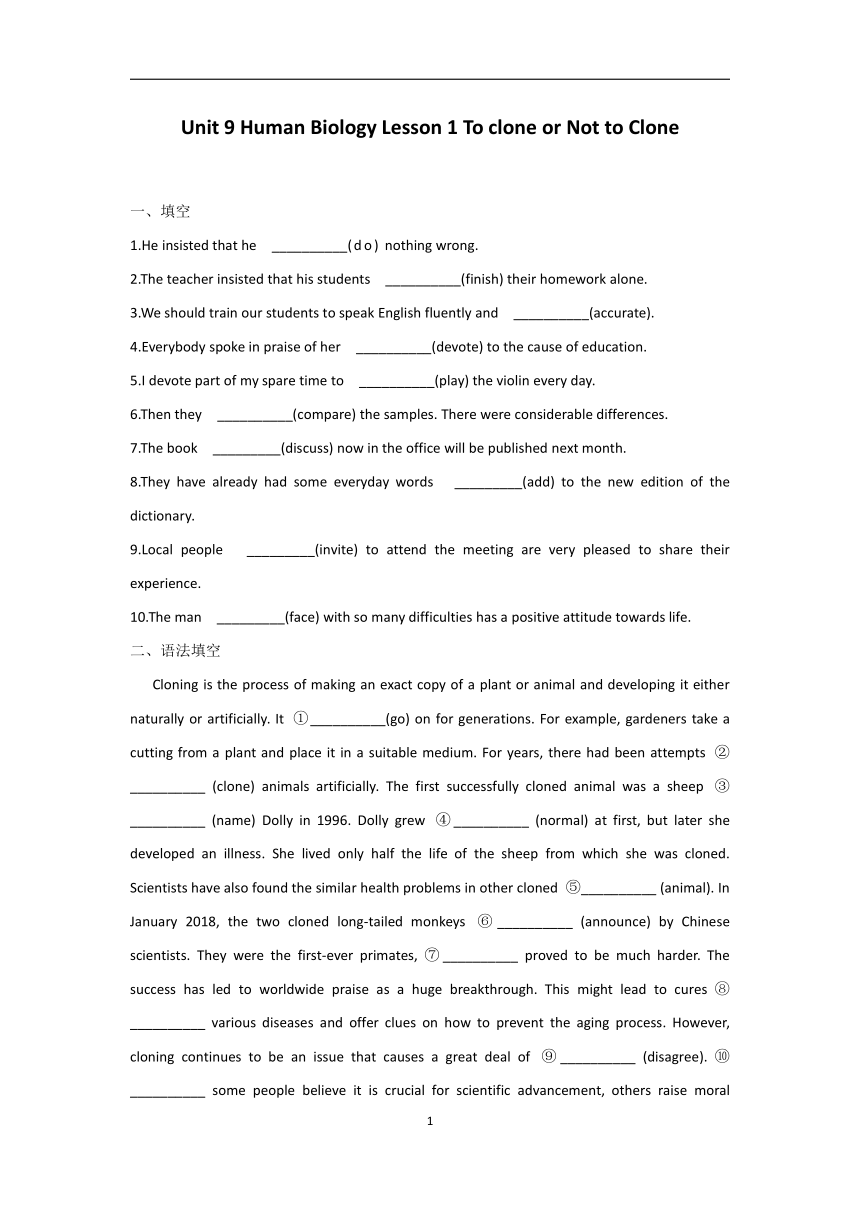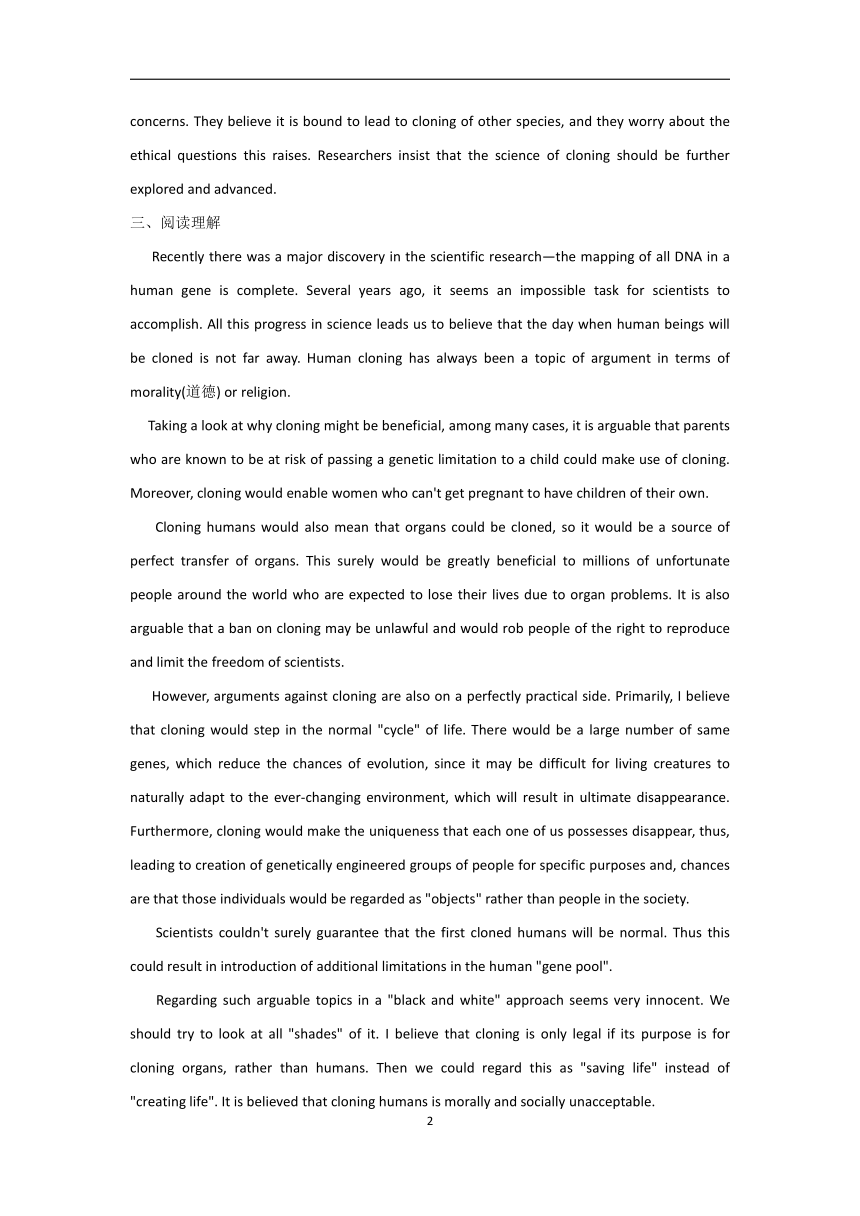北师大版(2019)选择性必修第三册Unit 9 Human Biology Lesson 1 To clone or Not to Clone同步课时作业(含答案)
文档属性
| 名称 | 北师大版(2019)选择性必修第三册Unit 9 Human Biology Lesson 1 To clone or Not to Clone同步课时作业(含答案) |

|
|
| 格式 | docx | ||
| 文件大小 | 43.3KB | ||
| 资源类型 | 教案 | ||
| 版本资源 | 北师大版(2019) | ||
| 科目 | 英语 | ||
| 更新时间 | 2023-05-05 00:00:00 | ||
图片预览


文档简介
Unit 9 Human Biology Lesson 1 To clone or Not to Clone
一、填空
1.He insisted that he __________(do) nothing wrong.
2.The teacher insisted that his students __________(finish) their homework alone.
3.We should train our students to speak English fluently and __________(accurate).
4.Everybody spoke in praise of her __________(devote) to the cause of education.
5.I devote part of my spare time to __________(play) the violin every day.
6.Then they __________(compare) the samples. There were considerable differences.
7.The book _________(discuss) now in the office will be published next month.
8.They have already had some everyday words _________(add) to the new edition of the dictionary.
9.Local people _________(invite) to attend the meeting are very pleased to share their experience.
10.The man _________(face) with so many difficulties has a positive attitude towards life.
二、语法填空
Cloning is the process of making an exact copy of a plant or animal and developing it either naturally or artificially. It ①__________(go) on for generations. For example, gardeners take a cutting from a plant and place it in a suitable medium. For years, there had been attempts ②__________ (clone) animals artificially. The first successfully cloned animal was a sheep ③__________ (name) Dolly in 1996. Dolly grew ④__________ (normal) at first, but later she developed an illness. She lived only half the life of the sheep from which she was cloned. Scientists have also found the similar health problems in other cloned ⑤__________ (animal). In January 2018, the two cloned long-tailed monkeys ⑥__________ (announce) by Chinese scientists. They were the first-ever primates, ⑦__________ proved to be much harder. The success has led to worldwide praise as a huge breakthrough. This might lead to cures ⑧__________ various diseases and offer clues on how to prevent the aging process. However, cloning continues to be an issue that causes a great deal of ⑨__________ (disagree). ⑩__________ some people believe it is crucial for scientific advancement, others raise moral concerns. They believe it is bound to lead to cloning of other species, and they worry about the ethical questions this raises. Researchers insist that the science of cloning should be further explored and advanced.
三、阅读理解
Recently there was a major discovery in the scientific research—the mapping of all DNA in a human gene is complete. Several years ago, it seems an impossible task for scientists to accomplish. All this progress in science leads us to believe that the day when human beings will be cloned is not far away. Human cloning has always been a topic of argument in terms of morality(道德) or religion.
Taking a look at why cloning might be beneficial, among many cases, it is arguable that parents who are known to be at risk of passing a genetic limitation to a child could make use of cloning. Moreover, cloning would enable women who can't get pregnant to have children of their own.
Cloning humans would also mean that organs could be cloned, so it would be a source of perfect transfer of organs. This surely would be greatly beneficial to millions of unfortunate people around the world who are expected to lose their lives due to organ problems. It is also arguable that a ban on cloning may be unlawful and would rob people of the right to reproduce and limit the freedom of scientists.
However, arguments against cloning are also on a perfectly practical side. Primarily, I believe that cloning would step in the normal "cycle" of life. There would be a large number of same genes, which reduce the chances of evolution, since it may be difficult for living creatures to naturally adapt to the ever-changing environment, which will result in ultimate disappearance. Furthermore, cloning would make the uniqueness that each one of us possesses disappear, thus, leading to creation of genetically engineered groups of people for specific purposes and, chances are that those individuals would be regarded as "objects" rather than people in the society.
Scientists couldn't surely guarantee that the first cloned humans will be normal. Thus this could result in introduction of additional limitations in the human "gene pool".
Regarding such arguable topics in a "black and white" approach seems very innocent. We should try to look at all "shades" of it. I believe that cloning is only legal if its purpose is for cloning organs, rather than humans. Then we could regard this as "saving life" instead of "creating life". It is believed that cloning humans is morally and socially unacceptable.
1.What is the author's opinion on cloning
A.Cloning should be entirely banned.
B.Cloning should be used in creating life.
C.Cloning will take away the right to reproduce.
D.Cloning is acceptable if it is used for cloning organs.
2.Which of the following shows the structure of the passage
A. B.
C. D.
3.Where is the passage probably from
A.A storybook. B.A magazine.
C.A work of science fiction. D.A novel.
答案以及解析
一、填空
1.答案:had done
2.答案:finish
3.答案:accurately
4.答案:devotion
5.答案:playing
6.答案:compared
7.答案:being discussed
8.答案:added
9.答案:invited
10.答案:faced
二、语法填空
答案:has been going ; to clone; named; normally ; animals ; were announced; which ; for ; disagreement ; While
三、阅读理解
答案:1-3.DAB
解析:1.细节理解题。根据最后一段中的"I believe that cloning is only legal if its purpose is for cloning organs, rather than humans."可知,作者认为只有克隆器官时克隆才是合法的。D项"Cloning is acceptable if it is used for cloning organs."符合语境。
2.推理判断题。文章第一段中的"Human cloning has always been a topic of argument in terms of morality(道德) or religion."引出论点;第二、三段提出支持方的观点"Taking a look at why cloning might be beneficial..." ;第四、五段提出反对方观点"However, arguments against cloning are also on a perfectly practical side.";第六段提出个人观点"We should try to look at all 'shades' of it."。故本文的结构是:提出论点(第1段)——正方观点(第2、3段)/反方观点(第4、5段)——个人观点(第6段)。故选A项。
3.推理判断题。通读全文可知,本文提出克隆是一个有争议的话题,列举了支持方和反对方的观点,最后总结陈词,发表了自己的观点。这是一篇和社会伦理道德相关的文章,由此推测很有可能出现在杂志上。B项"A magazine."符合以上推测。
2
一、填空
1.He insisted that he __________(do) nothing wrong.
2.The teacher insisted that his students __________(finish) their homework alone.
3.We should train our students to speak English fluently and __________(accurate).
4.Everybody spoke in praise of her __________(devote) to the cause of education.
5.I devote part of my spare time to __________(play) the violin every day.
6.Then they __________(compare) the samples. There were considerable differences.
7.The book _________(discuss) now in the office will be published next month.
8.They have already had some everyday words _________(add) to the new edition of the dictionary.
9.Local people _________(invite) to attend the meeting are very pleased to share their experience.
10.The man _________(face) with so many difficulties has a positive attitude towards life.
二、语法填空
Cloning is the process of making an exact copy of a plant or animal and developing it either naturally or artificially. It ①__________(go) on for generations. For example, gardeners take a cutting from a plant and place it in a suitable medium. For years, there had been attempts ②__________ (clone) animals artificially. The first successfully cloned animal was a sheep ③__________ (name) Dolly in 1996. Dolly grew ④__________ (normal) at first, but later she developed an illness. She lived only half the life of the sheep from which she was cloned. Scientists have also found the similar health problems in other cloned ⑤__________ (animal). In January 2018, the two cloned long-tailed monkeys ⑥__________ (announce) by Chinese scientists. They were the first-ever primates, ⑦__________ proved to be much harder. The success has led to worldwide praise as a huge breakthrough. This might lead to cures ⑧__________ various diseases and offer clues on how to prevent the aging process. However, cloning continues to be an issue that causes a great deal of ⑨__________ (disagree). ⑩__________ some people believe it is crucial for scientific advancement, others raise moral concerns. They believe it is bound to lead to cloning of other species, and they worry about the ethical questions this raises. Researchers insist that the science of cloning should be further explored and advanced.
三、阅读理解
Recently there was a major discovery in the scientific research—the mapping of all DNA in a human gene is complete. Several years ago, it seems an impossible task for scientists to accomplish. All this progress in science leads us to believe that the day when human beings will be cloned is not far away. Human cloning has always been a topic of argument in terms of morality(道德) or religion.
Taking a look at why cloning might be beneficial, among many cases, it is arguable that parents who are known to be at risk of passing a genetic limitation to a child could make use of cloning. Moreover, cloning would enable women who can't get pregnant to have children of their own.
Cloning humans would also mean that organs could be cloned, so it would be a source of perfect transfer of organs. This surely would be greatly beneficial to millions of unfortunate people around the world who are expected to lose their lives due to organ problems. It is also arguable that a ban on cloning may be unlawful and would rob people of the right to reproduce and limit the freedom of scientists.
However, arguments against cloning are also on a perfectly practical side. Primarily, I believe that cloning would step in the normal "cycle" of life. There would be a large number of same genes, which reduce the chances of evolution, since it may be difficult for living creatures to naturally adapt to the ever-changing environment, which will result in ultimate disappearance. Furthermore, cloning would make the uniqueness that each one of us possesses disappear, thus, leading to creation of genetically engineered groups of people for specific purposes and, chances are that those individuals would be regarded as "objects" rather than people in the society.
Scientists couldn't surely guarantee that the first cloned humans will be normal. Thus this could result in introduction of additional limitations in the human "gene pool".
Regarding such arguable topics in a "black and white" approach seems very innocent. We should try to look at all "shades" of it. I believe that cloning is only legal if its purpose is for cloning organs, rather than humans. Then we could regard this as "saving life" instead of "creating life". It is believed that cloning humans is morally and socially unacceptable.
1.What is the author's opinion on cloning
A.Cloning should be entirely banned.
B.Cloning should be used in creating life.
C.Cloning will take away the right to reproduce.
D.Cloning is acceptable if it is used for cloning organs.
2.Which of the following shows the structure of the passage
A. B.
C. D.
3.Where is the passage probably from
A.A storybook. B.A magazine.
C.A work of science fiction. D.A novel.
答案以及解析
一、填空
1.答案:had done
2.答案:finish
3.答案:accurately
4.答案:devotion
5.答案:playing
6.答案:compared
7.答案:being discussed
8.答案:added
9.答案:invited
10.答案:faced
二、语法填空
答案:has been going ; to clone; named; normally ; animals ; were announced; which ; for ; disagreement ; While
三、阅读理解
答案:1-3.DAB
解析:1.细节理解题。根据最后一段中的"I believe that cloning is only legal if its purpose is for cloning organs, rather than humans."可知,作者认为只有克隆器官时克隆才是合法的。D项"Cloning is acceptable if it is used for cloning organs."符合语境。
2.推理判断题。文章第一段中的"Human cloning has always been a topic of argument in terms of morality(道德) or religion."引出论点;第二、三段提出支持方的观点"Taking a look at why cloning might be beneficial..." ;第四、五段提出反对方观点"However, arguments against cloning are also on a perfectly practical side.";第六段提出个人观点"We should try to look at all 'shades' of it."。故本文的结构是:提出论点(第1段)——正方观点(第2、3段)/反方观点(第4、5段)——个人观点(第6段)。故选A项。
3.推理判断题。通读全文可知,本文提出克隆是一个有争议的话题,列举了支持方和反对方的观点,最后总结陈词,发表了自己的观点。这是一篇和社会伦理道德相关的文章,由此推测很有可能出现在杂志上。B项"A magazine."符合以上推测。
2
